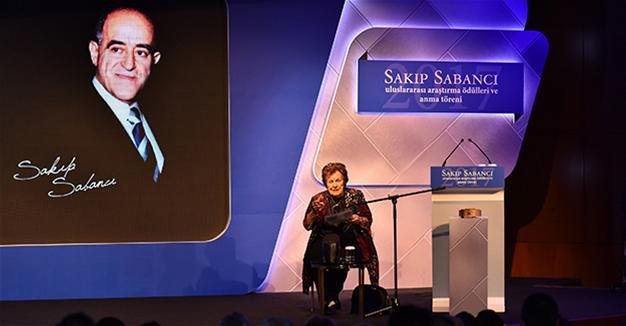Leading academic Abadan-Unat receives top Sabancı award for studies on Turkish migration
ISTANBUL
 Leading academic Nermin Abadan-Unat has been awarded the jury’s special prize at the prestigious Sakıp Sabancı International Research Awards for her works on the nature and the impact of Turkish migration.
Leading academic Nermin Abadan-Unat has been awarded the jury’s special prize at the prestigious Sakıp Sabancı International Research Awards for her works on the nature and the impact of Turkish migration. In honor of the late Sakıp Sabancı, the honorary chairman of the board of trustees of Sabancı University, the awards were presented at a ceremony on April 10.
He was commemorated with the prestigious awards on the 13th year of his passing.
The theme for this year’s awards was “Europeans with Turkish Origin in Daily Life.”
According to a follow-up release, the theme of the awards were determined due to Turkey’s lagging behind in achieving its ambitious targets to reduce gender inequality in economic, political and social lives despite many endeavors and progresses.
Abadan-Unat, 96, received the prestigious award for leading the studies both in Turkey and abroad on Turkish immigration.
The three equally-weighted Essay Awards were given to Defne Kadıoğlu Polat, an independent researcher; Zeynep Selen Artan-Bayhan from the City University of New York; and Tolga Tezcan from Florida University for their distinguished work on Turkish immigrants.
Sabancı University Founding Board of Trustees Chair Güler Sabancı and Sabancı University’s President Ayşe Kadıoğlu presented the award to Abadan-Unat.
In her speech at the award ceremony, Güler Sabancı praised contributions of Sakıp Sabancı to the Turkish economy and the innovative entrepreneurial culture of the country, noting that Sabancı University gained a well-deserved respected reputation in global rankings, which Sakıp Sabancı would have been very proud of.
She noted that immigration movements had become one of the most significant elements of modern politics.
“In our globalized lives, such movements have led to several conflicts as well as constructive interactions,” said Güler Sabancı.
Priority to new citizens
In her speech, Abadan-Unat said more than 4.5 million Turks now live abroad; around 3 million of whom are in Europe, which some 80 percent of them are 3 million Turks in Germany.
“It is a must for all of us to take a thorough consideration on the relations between the countries which have opened their doors to newcomers and the sender countries especially in the post-WWII era,” she said, adding that the general characteristics of the Turkish diaspora had become more vibrant and of higher quality in time.
Speaking about the rise of “extreme nationalism” trend in EU countries amid increasingly complicated issues emerging in the realm of international relations, she added, “It is a must to prioritize newcomers’ needs in the age of social networks. We cannot ignore the transnational social identities.”
Abadan-Unat has a long history as a devout advocate of women’s rights in Turkey. She graduated from law school at Istanbul University and pursued her graduate studies as a Fulbright student at the University of Minnesota between 1952 and 1953. She taught political science from 1953 to 1989 at Ankara University’s Faculty of Political Science. She specialized in mass communication, electoral studies, as well as women’s studies and international migration.
















